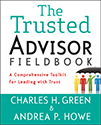This post is part of our Weekly Tips series.
The act of listening itself creates relationship and trust. This is straightforward enough in theory; in practice it’s more challenging because it means you have to redirect your efforts from convincing the other person’s intellect (a relative safe zone) to winning the other person’s heart (very different terrain).
What most of us have been taught—usually dubbed “active listening”—is far from sufficient when it comes to making a real connection. That’s because what most leadership and sales training programs teach is listening for a purpose. And usually that purpose is subtly self-oriented: to sell, to convince, to buy time until it is your turn to talk.
The kind of listening that engenders trust—deep trust—is listening for the sole purpose of paying attention. It is empathetic, through and through. The focus is not on what you hear, but on the act of listening itself.
This advanced form of listening (I call it “masterful listening”) requires more than taking good notes or periodically pausing to summarize the content of a conversation. It means tuning into the music, the tone, mood, and emotion as well as the words of someone’s communication, then reflecting it all back accurately and frequently enough that you get some kind of cue that you are relating to the entirety of their world.
The best part of this very special kind of listening is this: anyone can do it. It just takes practice.
Make It Real
This week, practice both paraphrasing and empathizing. Stop to show people you’re really tuned in to what they’re saying (both the words and the “music”) before you ask your next question or make your next comment. Try these starter phrases:
Paraphrasing:
- “It sounds like you have three concerns …”
- “So in other words, it’s an opportunity to …“
- “I hear you saying …”
Empathizing:
- “I can appreciate how [frustrating/disappointing/unnerving/exciting/motivating] that might be”
- “If I were in your shoes, I would probably be [concerned/upset/angry/ready to throw in the towel/relieved/encouraged/psyched], too”
- “It seems like this is a(n) [stressful/challenging/energizing] situation”
Learn More

- Find out why empathy really isn’t all that difficult, or discover what to do when you don’t agree with what’s being said in Chapter 6 of The Trusted Advisor Fieldbook: A Comprehensive Toolkit for Leading with Trust.
Andrea Howe
Latest posts by Andrea Howe (see all)
- Role models for healthy candor - May 27, 2025
- A small gesture (and related risk) with big trust impact (Part II) - April 1, 2025
- A small gesture (and related risk) with big trust impact (Part I) - March 3, 2025
